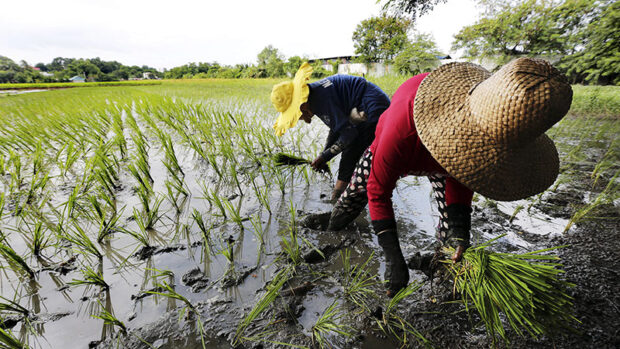Revival of statistics bureau eyed to address farm data accuracy

GROUND INFO | The Department of Agriculture wants better and complete information on the country’s agricultural production to help guide the agency in crafting policies that will benefit farmers, traders, and consumers. (Photo by GRIG C. MONTEGRANDE / Philippine Daily Inquirer)
MANILA, Philippines — Newly appointed Agriculture Secretary Francisco Tiu Laurel Jr. intends to revive the Bureau of Agricultural Statistics (BAS) to ensure the accuracy and completeness of data in the agriculture sector.
In a press briefing on Monday, Laurel said the current database was “somewhat incomplete,” making it difficult to manage domestic production of and demand for agricultural products.
“Our data is not that accurate. I’m not blaming anyone for this, but one of the major things I want to start is [to] bring back [BAS] so we will have accurate data,” Laurel noted.
Agriculture Assistant Secretary Arnel de Mesa said the responsibility of gathering and analyzing relevant information has been delegated to other agencies and the local government units (LGUs).
“We have data coming from the LGUs… from (DA) regional field offices, from the PSA (Philippine Statistics Authority) and institutional stakeholders. This is what the new agriculture secretary wants to fix,” De Mesa said.
The BAS was created through Executive Order (EO) No. 116 issued on Jan. 30, 1987, to replace the Bureau of Agricultural Economics, which was established in 1963.
EO 116 mandated the BAS to collect, compile, and release official agricultural statistics; exercise technical supervision over data collection centers; and coordinate all agricultural statistics and economic research activities of all bureaus, corporations, and offices under the Department of Agriculture (DA).
But even under the DA, the former BAS was one of the four major agencies in the national statistical network engaged in data collection and compilation, the others being the National Statistics Office, the National Statistical Coordination Board, and the Bureau of Labor and Employment Statistics.
These agencies were abolished and integrated into the PSA with the enactment of Republic Act No. 10625, or the Philippine Statistics Act of 2013.
‘Sacrifice, not payback’
In the same briefing, Laurel also refuted claims that his appointment was a “payback” for his significant contribution to the campaign of longtime friend President Ferdinand Marcos Jr. in the elections last year.
“Definitely, there’s no payback. As I said, [this is a] sacrifice. This is for the country,” Laurel said.
The official said he had already divested his interests in Frabelle Group of Companies, whose diversified business interests include deep-sea fishing, aquaculture, canning, food manufacturing and processing, food importation and trading, cold storage, shipyard operations, wharf development, real estate development and power generation.
“I have no more interests in all the companies I used to own,” he said.
“[The] DA is a full-time job. I have no time to do anything else. Ang laki ng departamento, complicated ng kaunti (The department is huge, it is somewhat complicated). This is a full-time job. Wala akong oras (I don’t have much time) to think about other things,” he pointed out.

Agriculture Secretary Francisco Tiu Laurel Jr. (Photo from the Facebook page of the Department of Agriculture)
“When I was asked by the President to join the DA, I actually hesitated a couple of times. At the end of the day, [I was challenged] to do something for the country,” he added.
Marcos announced his successor on Friday after he himself managed the agriculture portfolio for 16 months.
Pressing issues
In another development, farmers, fisherfolk, peasant women, agricultural workers, and food security advocates held a protest on Monday outside the DA in response to the appointment of Laurel.
The protesters emphasized the need for Laurel to address issues such as food price reduction, agricultural smuggling, and protection of small farmers and fisherfolk.
The Kilusang Magbubukid ng Pilipinas (KMP) expressed apprehension that Laurel’s appointment could lead to further liberalization of domestic agriculture and food production, particularly in the fisheries sector.
KMP said the new DA secretary needed to reverse existing liberalization policies that had worsened domestic crises in agriculture and food security.
Fishers’ group Pambansang Lakas ng Kilusang Mamamalakaya ng Pilipinas (Pamalakaya) also said it would be “extra vigilant” with Laurel, given his background in the fishing industry.
“We demand significant and genuine reforms in agri-fisheries policies that will be in favor of our local food producers and rural sectors,” said Pamalakaya vice chair Ronnel Arambulo.
But international nongovernment organization Oceana Philippines welcomed the long-overdue appointment of a permanent DA secretary and said it was hoping Laurel would ensure the full enforcement of fisheries laws and regulations.